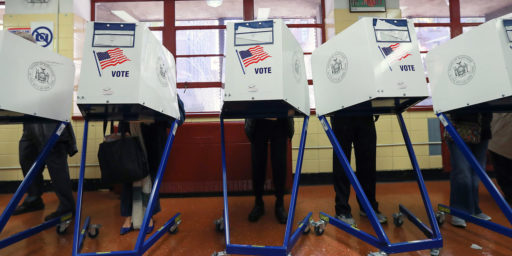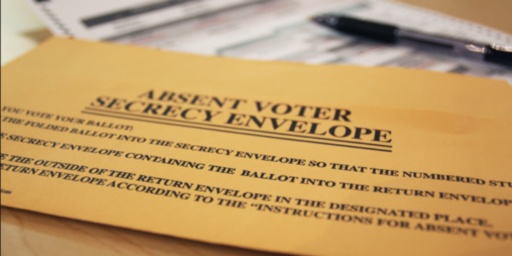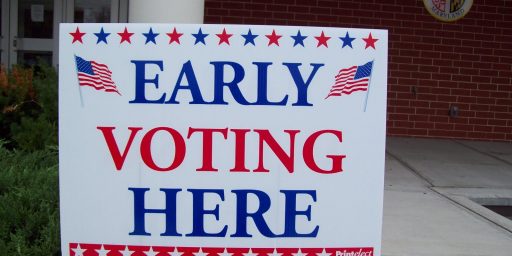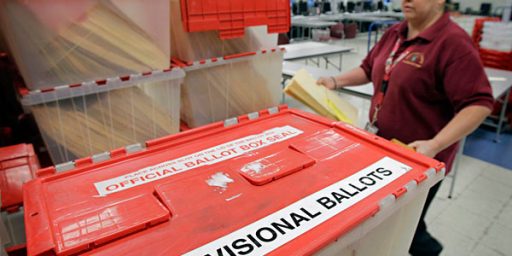Early Voting Begins In Presidential Battlegrounds
Early Voting Begins In Presidential Battlegrounds (Richard Harwood, WSJ)
Iowa kicked off a surge of early voting in presidential battlegrounds, where more voters than ever will cast ballots away from polling places ahead of Election Day. The fast start showed why so many Americans embrace the trend — and why it makes others nervous. Responding to low turnout rates by time-squeezed voters, elections officials nationwide are relaxing reins on procedures to make voting more convenient. This fall, about half the 15 or so states that President Bush and Sen. John Kerry are most closely contesting will allow voters to cast ballots early for any reason. Analysts estimate that from 25% to 30% of the national vote may already be in before polls open on Nov. 2.
For months, both the Democratic and Republican parties have encouraged members to request absentee ballots, through mailings that include detachable application-request forms and phone calls. They also have reached out to independents and dissidents in the other party whom they have identified — through phone banks and door-knocking walks — as supporting their candidate. The effort to harvest the early votes began in earnest here Friday, as tens of thousands of ballots were mailed to Iowans who requested them. “Ballot chasers” such as Kerry-backer Bill Summers collected completed ballots from grateful shut-ins who feared they wouldn’t make it to the polls. They also encountered skepticism from those suspicious of the prospects for fraud. “It seems strange to me that you’d be picking up absentee ballots,” barked retired state trooper Jack Moore, whose wife, Margie, received one. “How do I know you’re going to take her vote and vote it for Kerry, instead of throwing it away to benefit Bush?” Mr. Summers offered what assurance he could by displaying a blue tag identifying him as an “official absentee ballot courier,” trained under state guidelines that entitle him to handle marked ballots. In addition to the state’s earnest political traditions, Iowans rely on detailed early-vote regulations enacted by the Legislature to minimize the possibility that partisan operatives could either pressure voters to favor their candidate or destroy the ballots of those favoring the other side.
*** Republicans raise concerns from the opposite direction, not about fraud, but rather the prospects that a state government led by Democratic Gov. Tom Vilsack is exploiting early voting to tilt the political playing field. Mr. Failor plans to send a direct-mail piece this week that complains about Democrats’ use of “taxpayer dollars” on absentee ballots, while urging Republicans to vote by that method as well. “Why should Democrats be the only ones who vote by mail?” the brochure says. Its message tracks that of automated calls that Democrats say voters have begun receiving from prominent Republicans including U.S. Sen. Charles Grassley.
Students of election procedures say the risks of fraud are different only in kind from those associated with traditional methods of voting by punch-card ballots or their high-tech successors at polling places. One leading expert, Curtis Gans of the Committee for the Study of the American Electorate, a nonpartisan elections-research group in Washington, dislikes the drift toward early voting as harmful to the Election Day civic ritual. But the dangers of “pressured voting” or ballot theft, he argues, are no more inherently likely than those of corrupt tabulation or voter disenfranchisement on Election Day.
Mass voting by absentee ballots is inherently more likely to allow fraud or pressured voting, as shut-ins are exploited by those engaged in electioneering, whether they be church officials, party operatives, or the nursing home staff. More problematic, though, is that it changes the election dynamic set forth by the Congress. Federal elections are supposed to take place on the Tuesday following the first Monday in November. If balloting is already taking place in September–before the debates, even–then the expressed will of the people’s representatives has been violated.





